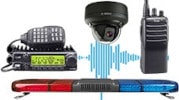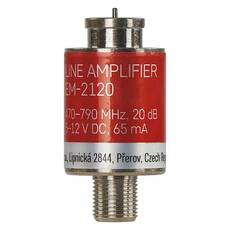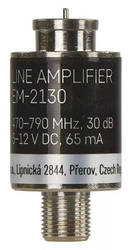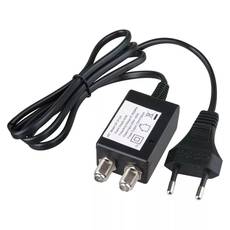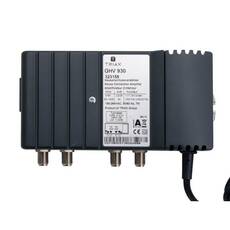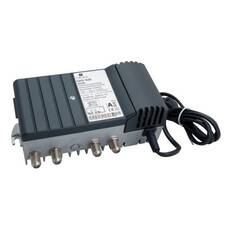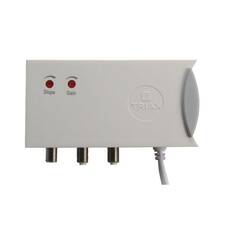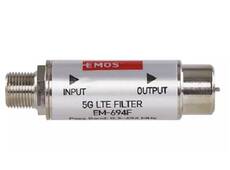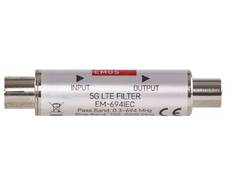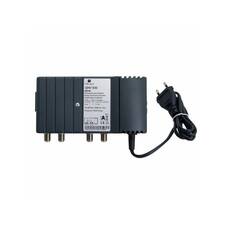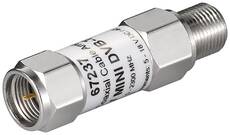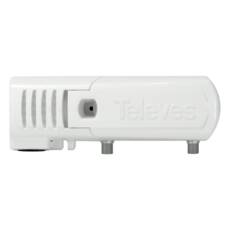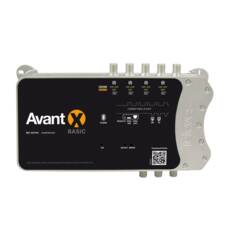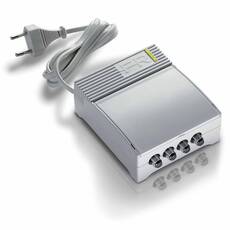TV Antenna Amplifier
The right receiving antenna is key to stable and high-quality digital TV viewing. However, there are sometimes difficulties in installing an antenna due to the geography of the area or the location of the antenna. In such cases, it may be necessary to install an amplifier to compensate for the low reception level. An antenna amplifier helps to better distribute the signal between multiple TVs in the home or building. This allows the sets to display better picture and clearer sound. Read more...
• Connectors: connector F
• Number of inputs 1; number of outputs 1
• Frequency range: 470-790 MHz
• Amplification: 20 dB
• Noise figure: <2.0 dB
• Power supply: 5-12 V DC, 65 mA
• LTE filter
• Dimensions: 20 × 42 mm
• IP45 protection
• To provide power supply, 1 power supply unit J58133 is required, which must be ordered separately!
• Type: shielded line amplifier
• Input (ANT): F male
• Outpu (TV): F female
• Gain: 30 dB
• Frequency range: 470–790 MHz
• Power source: 5–12 V DC, 65 mA
• 1 pc power supply J58133 is also required to provide DC power, which must be ordered separately!
• The EMOS Power Supply is designed to power 12V/100mA antenna preamplifiers
• Output voltage: 12 V
• Input voltage: 110-230 V
• Connector: F-connector
• Type: SMPS switched
• Dimensions: 24 × 68 × 35 mm
• The picture shows the version with model number J58133
• The TRIAX GHV 930 professional broadband amplifier is suitable for amplifying signals from terrestrial antennas, antenna systems and cable networks
• Frequency range: 47-1006/85-1006 MHz
• Equalisation: 0-15
• Quieting: 0-15 dB
• Gain: 30 (1006 MHz) dB
• Gain return (60 MHz): 22/28 dB
• Noise figure: 7 dB
• RF connector - test point input: bidirectional -20 dB
• RF connector - test point output: directional -20 dB
• Dimensions: 65 mm (height) x 170 mm (width) x 100 mm (depth) x 0.714 kg
• IP20 protection
• The TRIAX GHV 900 Series is a low noise coaxial house and apartment distribution amplifier for use in small CATV distribution networks in multi-family dwellings
• Frequency range: 47-1006/85-1006 MHz
• Gain: 35 (1006 MHz) dB
• Noise figure: 7 dB
• Equalization: 0-15
• Equalization: 0-15 dB
• RF connector test point: input -20 dB (bidirectional); output -20 dB (directional)
• Dimensions: 65 mm (height) x 170 mm (width) x 100 mm (depth)
• IP20 protection
• The Triax IFA 313 amplifier is an indoor amplifier with, ideal for use in family houses, homes
• 1 input; 2 outputs
• Output connector: F socket 75 ohm with automatic termination
• Input connector: F socket
• Frequency range: 87-862 MHz
• Return frequency range: 5-65 MHz
• Equalization: 0-18
• Attenuation: 5-20 dB
• Passive return with attenuation - 5, 0dB
• Gain: 0-20 dB
• Noise figure: < 6.0
• AC supply voltage: 100-240 VAC
• Output level IMD 2, EN 50083-3101,0 dBµV
• Output level IMD 3, EN 50083-5108,0 dBµV
• Dimensions: 44 mm (height) x 118 mm (width) x 61 mm (depth) x 0.299 kg
• LTE/5G filter
• Connectors: connector F
• Frequency range: 0.3-694 MHz
• Number of inputs 1; number of outputs 1
• Suppressed band: 700-2 400 MHz
• Suppressed band attenuation >40 dB
• Preamps with DC power supply, 300 mA
• Dimensions: 16 × 40 mm
• IP20 protection
• LTE/5G filter
• Connectors: IEC
• Frequency range: 0.3-694 MHz
• Number of inputs 1; number of outputs 1
• Suppressed band: 700-2 400 MHz
• Suppressed band attenuation: >40 dB
• Preamplifiers with DC power supply 300 mA
• Dimensions: 16 × 68 mm
• IP20 protection
• Frequency: 47 - 1006MHz
• Amplification: 30 dB
• Noise factor: <7.0 (typ. 5) dB
• Return loss: at 40 MHz (-1.5 dB/octave)>18
• Output level CSO @ 60 dB IMD100 dB
• Output level CTB @ 60 dB IMD104 dB
• Connectors: F-connector
• Measurement point: -20 dB
• Power supply: (50-60 Hz) 190-264V
• Power consumption:<4W
• Operating temperature -25...+55°C
• Dimensions: 65 mm (height) x 100 mm (depth) x 170 mm (width)
• Weight: 650 g
• Suitable for analogue and digital transmission (DVB-S), 3D, SD, HD, Full HD and Ultra HD
• Input (antenna): F plug
• Output (TV): F socket
• Amplification: 10 dB
• Impedance 75 Ohm
• Frequency range: 5-2300 MHz
• Power supply: 5-18 V DC, 40 mA via receiver terminals
• Suitable for outdoor installation thanks to waterproof rubber seal
• Output: F connector
• Frequency range: 5-65 MHz, 88-1006 MHz
• Gain: -1 - 25 dBi
• Gain adjustment range: 0 - 18 dBi
• Output level DIN45004B: 116 dBμV
• Noise figure: 5 dB
• Input voltage: 220/230V
• Mains frequency: 50 Hz / 60 Hz
• Max. current: 24 mA
• Max. power consumption: 2,4 W
• Operating temperature: -5-45 °C
• Output: F connector
• Frequency range: 5-65 MHz, 88-1006 MHz
• Gain: -1 - 35 dBi
• Gain adjustment range: 0 - 18 dBi
• Output level DIN45004B: 116 dBμV
• Noise figure: 5 dB
• Input voltage: 220/230V
• Mains frequency: 50 Hz / 60 Hz
• Max. current: 24 mA
• Max. power consumption: 2,4 W
• Operating temperature: -5-45 °C
• Number of inputs: 5
• Number of outputs: 1
• Bands: FM, DAB, UHF
• Frequency range: 87-694 MHz
• Gain: 29-75 dBi
• Programmable output level: 80-115 dBμV
• Noise figure: 6-7 dBi
• Max current input: 70 mA
• Input voltage: 220 / 230V
• Mains frequency: 50 Hz / 60 Hz
• Max. current: 130 mA
• Operating temperature: -5 - 45 °C
• Frequency range: 47–230 MHz/ 470–790 MHz
• Gain: 20 dB
• Tunable gain: 15 dB
• Noise level: 4 dB
• Number of inputs and outputs: 1-1
• Output level (max.): 108 dBµV (in UHF band)
• Impedance: 75 ohms
• Connector: F type
• Dimensions: 166 x 98 x 47 mm
When to buy an antenna amplifier?
Most often, an antenna amplifier is needed when we feel the service should provide a clearer picture and sound than at present. Alternatively, you may find that you are unable to receive certain channels that you are supposed to be able to see according to your subscription. An aerial amplifier, as the name suggests, can boost the signal of your current TV set, solving the above problems. It is therefore advisable to install it as close as possible to the receiving antenna, preferably indoors.
An antenna amplifier can therefore help overcome signal loss due to cable resistance and signal splitting between several TVs. However, they miraculously do not convert a weak signal into a reliable signal. If the reception from the antenna is poor, the amplifier will only help to spread this poor quality signal. Furthermore, excessive amplifier power can also create noise if the right settings are not found, which can negatively affect the received TV signal. However, with proper use, we can solve signal problems and improve the quality of TV viewing.
Which antenna amplifier to choose?
Finding the right TV aerial amplifier is not an easy task, as there are many similar devices with similar specifications but completely different performance. Choosing the right amplifier has its own key criteria, and taking these into account will make it easier to choose the right amplifier:
- Gain: decibels (dB) measure the gain level generated by amplifiers. Indoor amplifiers typically generate between 16 dB and 24 dB of gain, but in most cases 10 - 15 dB is sufficient.
- Frequency range: frequencies between about 47-250 MHz and 470-960 MHz for television signals. Make sure you buy an amplifier that works at the frequencies you want.
- Number of outputs: It is important to consider how many outputs you need. Count the number of televisions you want to connect and buy a device with the same number of outputs. If there are too many unnecessary outputs, the quality of the final signal may be lower.
- Power supply. Our choice will be most influenced by the location where it is installed, as it will not always be possible to connect a 230V adaptor.
When to use an antenna preamplifier?
Just as an antenna amplifier is used to amplify the digitally scattered signal, a preamplifier is used to compensate for signal loss in long cable runs. If the signal is so weak that the length of the cable makes it impossible to detect the TV set, a preamplifier is needed. The key to selecting a preamplifier is to ensure that it has sufficient gain to compensate for the signal loss due to the cable run.
DND offers the Emos antenna preamplifier, which serves as a shielded line amplifier for signals in the 470-790 MHz frequency range. It can be ordered with a separate power supply to provide power.

